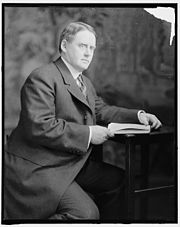Burke Act
Burke Act also Dawes Act Amendment of 1906 or Forced Fee Patenting Act was a law from 1906 which expanded and supplemented the Dawes Act , also known as the General Allotment Act of 1887. Named after the multiple representative of the state of South Dakota in the US Congress, it was one of the laws aimed at smashing the Indian reservations in the United States. The Dawes Act stipulated that indigenous people would be assigned plots of land individually and that they would be taken out of the tribal area after 25 years. Individual tribal members were allocated 320 and 160 acres of land, respectively . For the 25 years, the land was to be held in trust by the Home Office through the Bureau of Indian Affairs (BIA). At the end of the 25 years, the property should become the property of the Indian families.
The Burke Act supplemented the Dawes Act by giving the Home Secretary the right to classify individual owners of such properties as competent and incompetent, as Congress believed that most Indians were not competent to dispose of their properties, i.e. owners with them Land register entry to become. The Burke Act led to corruption within the BIA as it was now within the discretion of Indian agents whether or not an owner of a property was deemed competent. In some cases, the owner of a property has been deemed competent without telling him. Now that the property was no longer owned by the BIA, taxes became due (reservations were generally exempt from taxation) and after the owner failed to pay those taxes, the county or state expropriated the owner. Because many Indians didn't even know where their properties were. or the plots were far away from the settlement where the owners lived, the Indian agents had an easy time cheating off their plots of land by classifying the owner as incompetent, or threatening to sell their land after being classified as competent . Whether the owners could become citizens of the United States depended on their competence. The Burke Act only granted citizenship to owners once the land issue was resolved. The Home Office speculated that 95% of the owners would give up their claims on the land.
supporting documents
- ↑ Amends section 6 of the General Allotment Act, adding that the secretary of the interior is authorized to cause an issue of a patent in fee simple to an allottee whenever the secretary is convinced that the Indian allottee is competent and capable of managing his or her affairs (This did not require the Indian allottee's approval, desire, or knowledge of the fee simple patent issue).
- ↑ Under this act the secretary of the interior was given great authority over individual Indians who had taken allotments. The secretary decided whether an Indian was competent enough to handle his own affairs before he could even receive an allotment, and the secretary alone determined the legal heirs of a deceased allottee. If he determined there were no legal heirs, the allotted land could then be sold.
- ↑ A question that had long plagued the US government involved the citizenship status of American Indians. In 1887 Congress passed the General Allotment Act, or Dawes Severalty Act, which stated that Indians who received land allotments or voluntarily took up away residence from their tribes were to be given United States citizenship.
- ↑ The Burke Act pertained to Indians who Took allotments. The law withheld citizenship until the end of the twenty-five year trust period or until the allottee received a fee patent from the secretary of the interior. It further stated that any Indian who had taken up residence apart from the tribe and who had "adopted the habits of civilized life" was declared a citizen and was entitled to all the rights, privileges, and immunities of citizenship.
Web links
- Burke Act, Act of May 8, 1906 (34 Stat. 182) (English)
- History of Allotment (English)
